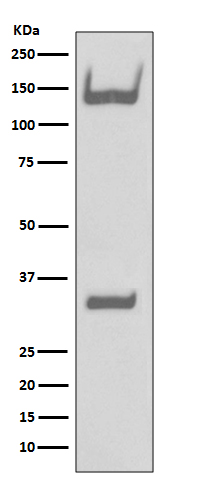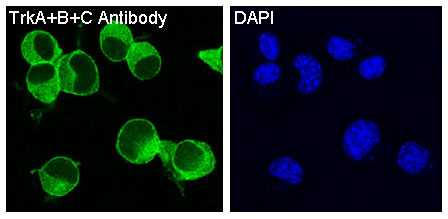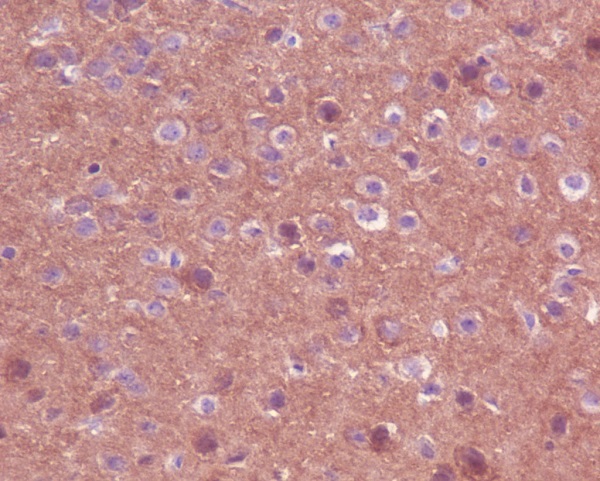


| WB | 1/500-1/1000 | Human,Mouse,Rat |
| IF | 咨询技术 | Human,Mouse,Rat |
| IHC | 1/50-1/100 | Human,Mouse,Rat |
| ICC | 1/50-1/200 | Human,Mouse,Rat |
| FCM | 咨询技术 | Human,Mouse,Rat |
| Elisa | 咨询技术 | Human,Mouse,Rat |
| Aliases | gp140trk; GP145-TrkB; GP145-TrkC; MTC; NTRK1; NTRK2; NTRK3; p140-TrkA; TRKA; TRKB; TrkB tyrosine kinase; TRKC |
| Entrez GeneID | 4914/4916/4915 |
| WB Predicted band size | Calculated MW: 87 kDa; Observed MW: 140 kDa |
| Host/Isotype | Rabbit IgG |
| Antibody Type | Primary antibody |
| Storage | Store at 4°C short term. Aliquot and store at -20°C long term. Avoid freeze/thaw cycles. |
| Species Reactivity | Human,Mouse,Rat |
| Immunogen | A synthesized peptide derived from human TrkA+B+C |
| Formulation | Purified antibody in PBS with 0.05% sodium azide. |
+ +
以下是3篇与Trk抗体相关的模拟参考文献示例(内容为虚构,仅供格式参考):
---
1. **文献名称**: *Targeting TrkA with monoclonal antibodies inhibits neuroblastoma progression in vivo*
**作者**: Liu Y. et al.
**摘要**: 研究报道了一种靶向TrkA受体的人源化单克隆抗体,通过体外和体内实验证明其能特异性抑制神经母细胞瘤的生长,并揭示了抗体通过阻断神经营养因子信号通路诱导肿瘤细胞凋亡的机制。
2. **文献名称**: *Development of a pan-Trk immunohistochemical antibody for diagnostic screening of NTRK gene fusions*
**作者**: Patel R. & Smith J.
**摘要**: 该文献描述了一种广谱Trk抗体的开发与验证,用于检测多种癌症中NTRK基因融合蛋白的表达。临床样本分析表明,该抗体与分子检测结果高度一致,可作为快速筛查NTRK融合肿瘤的可靠工具。
3. **文献名称**: *TrkB antibody-drug conjugate demonstrates efficacy in preclinical models of glioblastoma*
**作者**: Gonzalez M. et al.
**摘要**: 研究团队设计了一种靶向TrkB的抗体-药物偶联物(ADC),在胶质母细胞瘤小鼠模型中显著抑制肿瘤增殖并延长生存期。实验强调了TrkB在肿瘤侵袭性中的调控作用及抗体靶向治疗的潜力。
---
**注意**:以上文献信息为模拟内容,实际研究中请通过PubMed、Web of Science等平台检索真实发表的论文。
**Background of Trk Antibodies**
Trk (tropomyosin receptor kinase) antibodies are tools designed to target the Trk receptor family, comprising TrkA, TrkB, and TrkC, encoded by the *NTRK1*, *NTRK2*, and *NTRK3* genes, respectively. These receptors are transmembrane tyrosine kinases activated by neurotrophins—NGF (TrkA), BDNF/NT-4 (TrkB), and NT-3 (TrkC)—critical for neuronal development, survival, and synaptic plasticity. Dysregulation of Trk signaling, particularly through *NTRK* gene fusions (e.g., *ETV6-NTRK3*), drives oncogenesis in various cancers by constitutively activating downstream pathways like MAPK and PI3K-AKT, promoting uncontrolled cell proliferation.
Trk antibodies are pivotal in research and diagnostics for detecting Trk overexpression or fusion proteins, aiding in identifying *NTRK*-altered tumors. Therapeutically, Trk inhibitors (e.g., larotrectinib, entrectinib) have shown remarkable efficacy in *NTRK*-fusion-positive cancers, achieving high response rates. However, resistance mutations (e.g., *NTRK* G595R) and off-target effects necessitate continued development of next-generation inhibitors.
Monoclonal and polyclonal Trk antibodies enable precise localization and quantification of Trk proteins in tissues, supporting mechanistic studies and drug development. Their role extends to neurological research, exploring links between Trk dysfunction and neurodegenerative or psychiatric disorders. Overall, Trk antibodies bridge basic research and clinical translation, highlighting their dual significance in understanding neurobiology and advancing targeted cancer therapies.
×